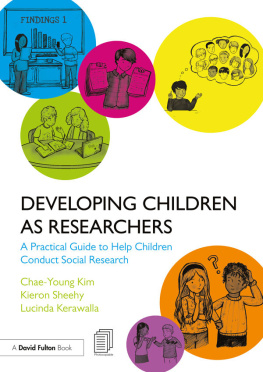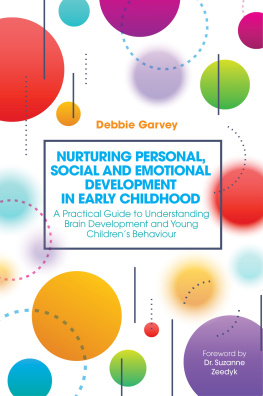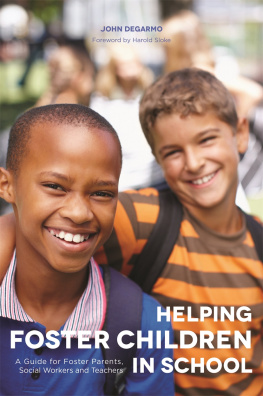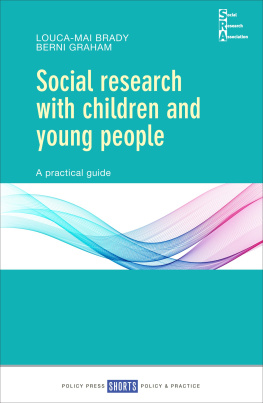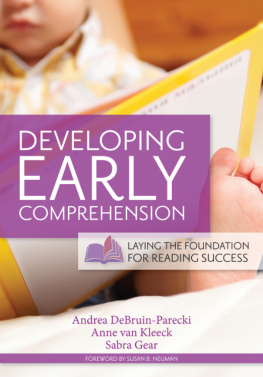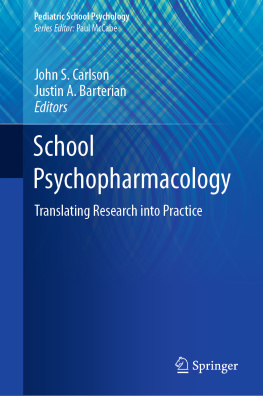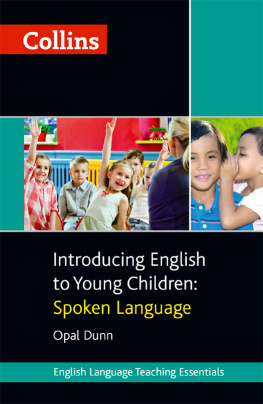Developing Children as Researchers
Encouraging young children to create and carry out their own social research projects can have significant social and educational benefits. In addition, their research may help them to influence local and national policies and practices on issues that matter to them. To support this, Developing Children as Researchers acts as a practical guide to give teachers and other adults who work with children a set of structured, easy-to-follow session plans that will help children to become researchers in their own right.
Comprising ten session plans that have already been tried and tested in schools, this guide will assist you in supporting child researchers while helping you to develop the techniques for teaching research skills effectively. The session plans also ensure that childrens views are heard and reflected by encouraging their active curiosity and investigation of issues that they may be concerned about. Forming a step-by-step guide, the ten sessions cover themes such as:
- starting the research process and identifying a research topic;
- the three key principles of research: be sceptical, systematic and ethical;
- choosing research participants and drawing up a research plan;
- the range of data collection and analysis methods;
- reporting the results of, and reflecting upon, a research project.
Childrens research has often depended upon the support of academic researchers to provide resources and training. By making the research training and facilitation process more widely accessible, this guide will help remove the psychological and practical hurdles that teachers and others who regularly work with children might feel about helping childrens research themselves.
Chae-Young Kim is an associate researcher at the Childrens Research Centre, the Open University, UK. She has previously worked for UNICEF in South Korea.
Kieron Sheehy researches inclusive education and innovation pedagogies. He is an active member of the Open Universitys Childrens Research Centre.
Lucinda Kerawalla is a former director of the Open Universitys Childrens Research Centre. She also researches the technological support of classroom dialogues and mobile learning.
Developing Children as Researchers
A Practical Guide to Help Children Conduct Social Research
Chae-Young Kim, Kieron Sheehy and Lucinda Kerawalla
First published 2017
by Routledge
2 Park Square, Milton Park, Abingdon, Oxon OX14 4RN
and by Routledge
711 Third Avenue, New York, NY 10017
Routledge is an imprint of the Taylor & Francis Group, an informa business
2017 Chae-Young Kim, Kieron Sheehy and Lucinda Kerawalla
The right of Chae-Young Kim, Kieron Sheehy and Lucinda Kerawalla to be identified as authors of this work has been asserted by them in accordance with sections 77 and 78 of the Copyright, Designs and Patents Act 1988.
All rights reserved. The purchase of this copyright material confers the right on the purchasing institution to photocopy pages which bear the photocopy icon and copyright line at the bottom of the page. No other parts of this book may be reprinted or reproduced or utilised in any form or by any electronic, mechanical, or other means, now known or hereafter invented, including photocopying and recording, or in any information storage or retrieval system, without permission in writing from the publishers.
Trademark notice: Product or corporate names may be trademarks or registered trademarks, and are used only for identification and explanation without intent to infringe.
British Library Cataloguing in Publication Data
A catalogue record for this book is available from the British Library
Library of Congress Cataloging in Publication Data
Names: Kim, Chae-Young, author. | Sheehy, Kieron, author. |
Kerawalla, Cindy, author.
Title: Developing children as researchers : a practical guide to help
children conduct social research / Chae-Young Kim, Kieron Sheehy
and Cindy Kerawalla.
Description: Abingdon, Oxon ; New York, NY : Routledge, 2017. |
Includes index.
Identifiers: LCCN 2016044658 | ISBN 9781138669253 (hardback) |
ISBN 9781138669260 (pbk.) | ISBN 9781315618203 (ebook)
Subjects: LCSH: Social sciences--Study and teaching (Elementary) |
Social sciences--Research--Study and teaching (Elementary) | Social
sciences--Methodolgy--Study and teaching (Elementary)
Classification: LCC LB1584 .K54 2017 | DDC 300.71--dc23
LC record available at https://lccn.loc.gov/2016044658
ISBN: 978-1-138-66925-3 (hbk)
ISBN: 978-1-138-66926-0 (pbk)
ISBN: 978-1-315-61820-3 (ebk)
Typeset in Palatino
by Saxon Graphics Ltd, Derby
Contents
Guide
The authors would like to thank the staff, children and parents of Wavendon Gate School in Milton Keynes, UK, for working with them to help develop the first drafts of the session plans included in this book. They are also grateful to their colleagues at the Children's Research Centre at the Open University for using the session plans and giving useful feedback to improve them.
Of the authors, Chae-Young Kim would like to express her special gratitude to her husband Andrew for making creative suggestions whenever she felt stuck and for his untiring encouragement concerning her research about and with children. While compiling this book, she was also reminded of her father, Mahn-Gon Kim, an educator in South Korea, who has stressed the significance of developing children's independent thinking skills and creativity in learning.
Finally the authors thank Emily Harper-Barlow for drawing illustrations which have made the text much more lively and accessible.
Would you like to help children to be researchers in their own right? If so, this book is for you. It contains ten ready-made session plans that you can use to help children to carry out their own social research projects. If you have not done social research yourself, or if your research skills are a little rusty, you may be worried that this may be a barrier to you supporting child researchers. However, the session plans in this book are designed for someone like you and, by using the plans with children, you can also learn about or enhance your own understanding of social research.
You may be wondering why working with child researchers is a good thing to do. Some people are interested in supporting child researchers to ensure that their views are heard and better reflected in the production of evidence about them. Other people wish children's opinions to be taken into account during the decision-making processes that affect their lives. Also, it has been suggested that the practice of children conducting their own research has educational benefits such as raised self-esteem and confidence, and improvements in literacy, numeracy, communication, information processing, critical thinking and higher-order thinking skills. As a result, children have been helped to conduct their own research in a wide range of settings such as schools and local communities.
The following quotes are from primary school teachers who have worked with child researchers and illustrate the value of this work:
Most of us, most of time, we probably underestimate hugely what children can do. Through this initiative, they learn a range of skills to apply to a topic of their own choice, investigate and present it in a rigorous way.

